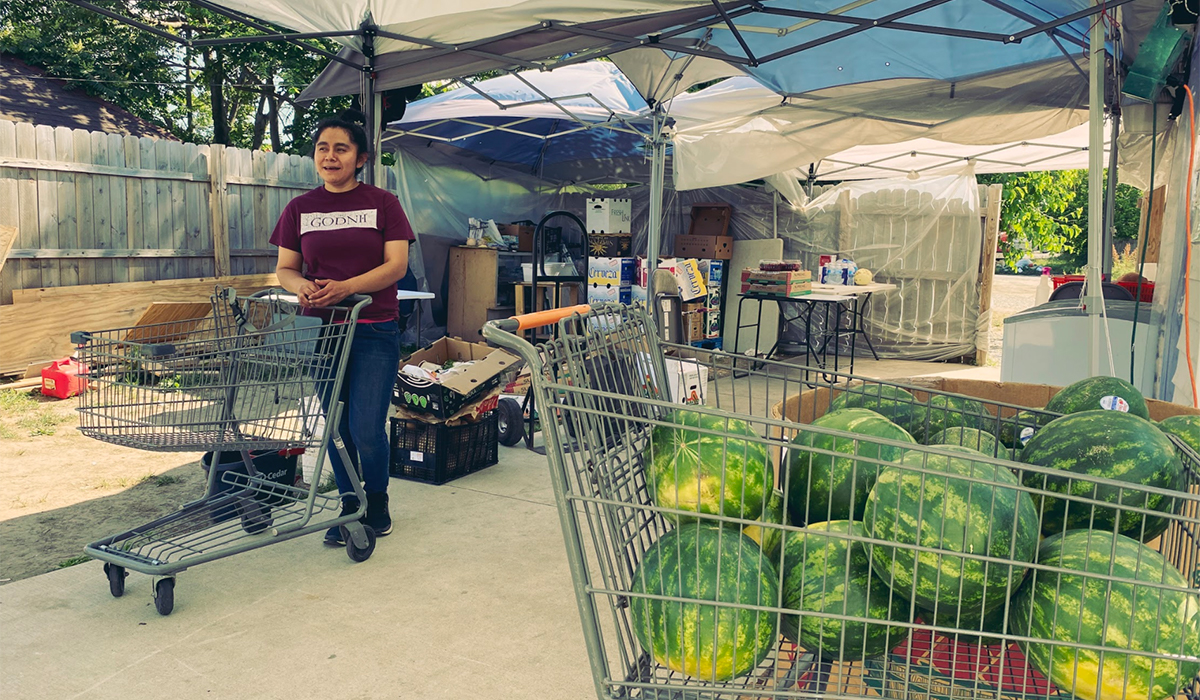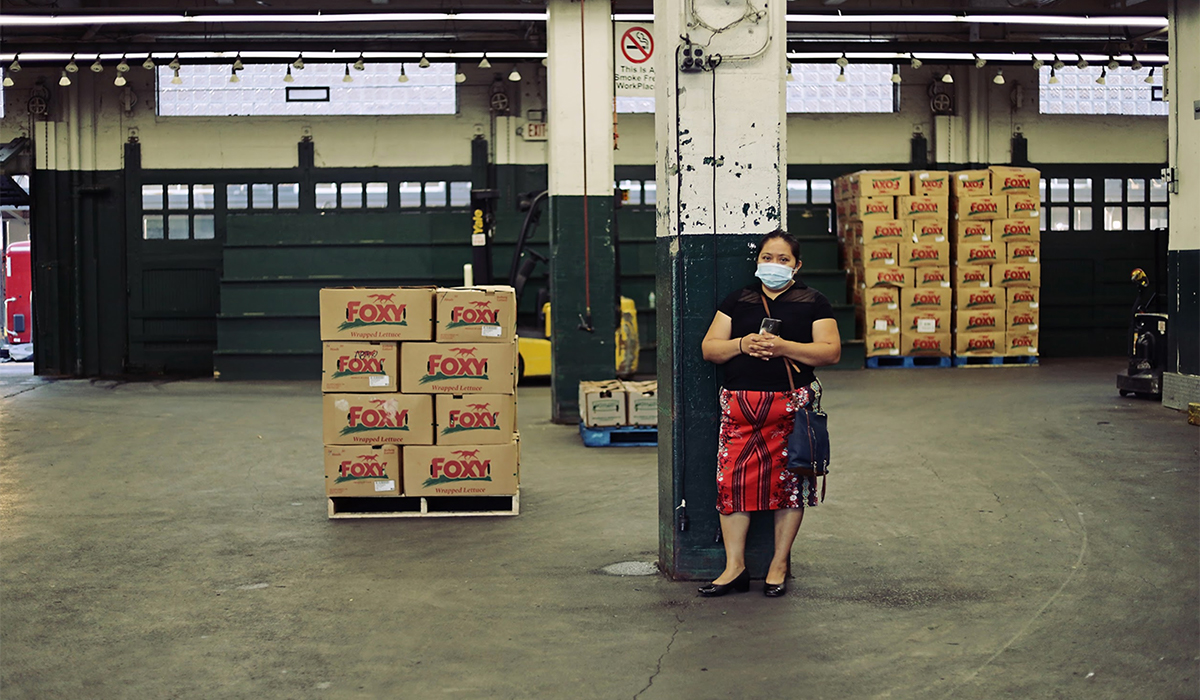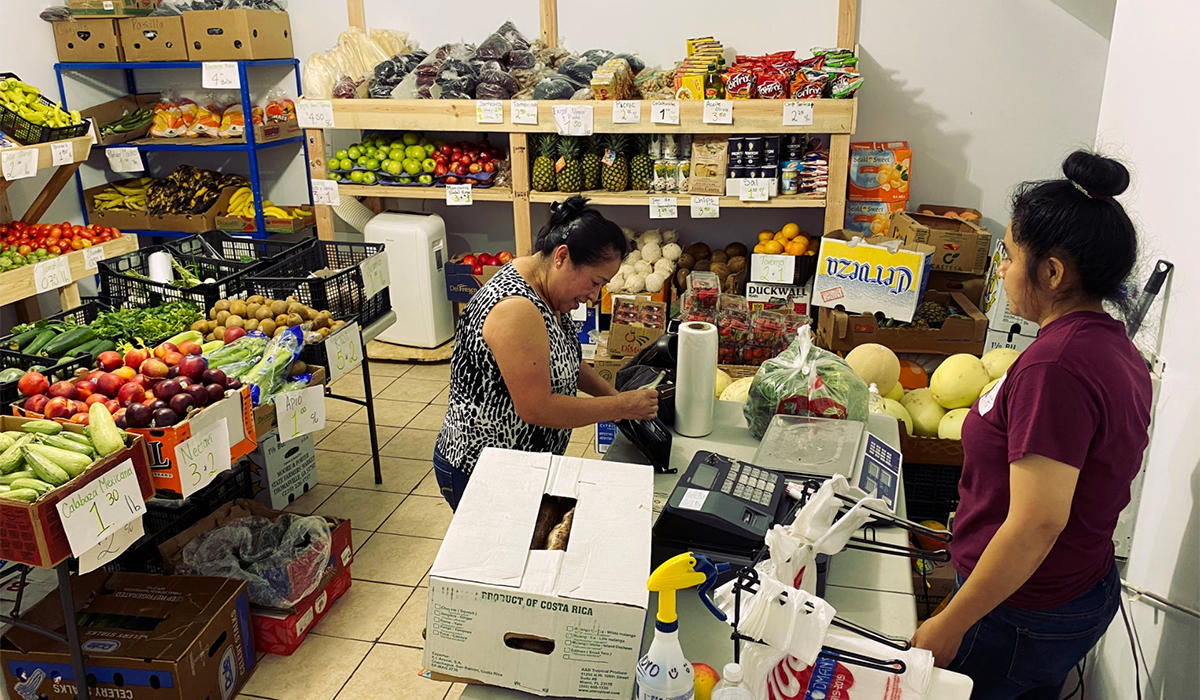DETROIT — On an early Friday morning, just a few minutes past sunrise, Dani Dueñas arrives at the Detroit Produce Terminal deep in Southwest Detroit to buy fruits and vegetables. Petite, wearing a floral skirt and with her long hair pulled neatly in a bun, Dueñas stands in the main lobby waiting to meet with vendors as forklifts and pallet jacks whizz by her. She looks out of place, but workers here recognize her as a longtime buyer who arrives most days to stock up on everything from mangoes to cilantro.
“I have big orders for the weekend and won’t be able to come back until Monday,” Dueñas says as she inspects a case of strawberries.
Her list of clients has grown in recent months, and she now delivers produce to Latinas as far as Romulus and Troy.
Dueñas is one of a handful of Latina entrepreneurs in Southwest Detroit who has been selling fruits and vegetables for years to supplement their families’ income. But with COVID-19 keeping many shoppers at home, their services are now in high demand. The pandemic turned their part-time hustle into a full-time job, filling a niche in the grocery supply chain.
Her side gig started five years ago, when her husband came home with 15 cases of mangoes. He’d gotten each case for $3 in a closeout sale. She was unsure what to do with all the fruit until her neighbor suggested she post them on Facebook.
“I didn’t know what Facebook was, so my friend helped me create an account. Once I posted that I had boxes of mangoes, people started calling,” Dueñas said. “I sold all 15 cases within two hours.”
She figured if she could sell mangoes, she could sell other fruit, too. She went to a few produce stores and found a deal on tomatoes and quickly sold them. It wasn’t long before she found herself at the Detroit Produce Terminal, where she now goes four days a week to buy everything she needs in one stop.
The Detroit Produce Terminal, one of only 13 such terminals still operating in the U.S., opens at midnight and supplies fruits and vegetables throughout Southeast Michigan. Big buyers are first in line to purchase, and only after those orders are filled can Dueñas get what she needs.
She doesn’t speak much English, but that didn’t stop her from making the first trip to the terminal five years ago. “I taught myself the names of the fruits in English,” Dueñas said in Spanish. “They understood what I wanted.”
“The pandemic has highlighted the importance of the undervalued work undertaken by women that is essential for keeping our economies running.” — Suzanne Bergeron
For years, Dueñas sold small amounts of produce that brought in anywhere from $50 to $100 a week. The money was a small but helpful addition to her family’s income. But as the coronavirus spread, and with Gov. Gretchen Whitmer imposing a stay-at-home order in mid-March, she started to get daily calls from women in the community with big orders to fill. Dueñas also began to offer food delivery, which got her more clients and increased her income to more than $400 a week—a 500 percent increase in her business.
Dueñas is part of the informal economy, much like people who sell on Craigslist and Facebook’s Marketplace. Though informal work is itself a contested concept, it typically refers to those activities that are not regulated or protected by the government.
According to the International Labor Organization, the informal economy makes up approximately 20 percent of the overall U.S. economy. Worldwide, it is closer to 60 percent.
“These activities include work in unregistered firms and household businesses, self-employment, as well as informalized jobs, without workplace protections or benefits,” said Suzanne Bergeron, an economist and professor of women’s studies at the University of Michigan-Dearborn.
“The pandemic has highlighted the importance of the undervalued work undertaken by women that is essential for keeping our economies running,” Bergeron said. “Yet this work is typically not counted in official statistics of production and employment.”
Bergeron adds that “decades of economic dislocations, declining access to decent work, and erosion of social protection has resulted in a rise in informal economy activities in Detroit. Though these activities are highly varied, many of them provide locally rooted ways of meeting needs in their communities.”
Not far from Dueñas lives Southwest Detroiter Bianca Morones. Several weeks ago, she received a text message with three photographs. Each photo was of a sheet of notebook paper with a long list of fruits and vegetables written on them. Next to each item was a price. Roma tomatoes $1.25 a pound, nopales $1 a pound, cilantro, two for $1 and so on. The list of produce was extensive.
She had heard about Latinas in the neighborhood selling fruits and vegetables but had never bought anything. She was faithful to her favorite stores, but it was April, during the height of the pandemic in Michigan, and Morones had two small children and a newborn, so she didn’t want to leave her house for fear of catching the coronavirus.
“The list had a lot of the fruits we eat, like papaya, coconut, prickly pears and fresh pineapples,” Morones said. “And they deliver.”
Getting food delivered was convenient, eliminated the fear of being exposed to COVID-19, and also saved her the time it would take to get her children dressed and loaded into the car with face masks.
“They come straight to my house and drop it on the porch. I leave the money in the mailbox, and I’m done,” Morones said.
“I feel that if you are buying from small places like this, you’re helping our community more than going to a Kroger or corporate store.” — Susanna Garza
She passed the text message on to other moms in the community, and word continued to spread.
Delivering the fruit to Morones was 32-year-old Jessica Fuentes, who has also been selling fruits and vegetables. Her father and grandfather were grocers back in Guatemala, so selling produce came naturally to her.
For years, Fuentes had set up her fruit and vegetable stand on her porch and made extra money selling to the Mexican, Central American and Yemeni immigrants on her block. It was a small operation that grew slowly.
She, too, started to deliver groceries because of COVID-19, and before she knew it, Fuentes had so much business that the entire family got involved. While she stays home and takes the orders, her sisters fill them and do the deliveries. As word spread, so did their clientele.
Standing in her driveway next to a shopping cart full of watermelons, Fuentes greets Roberta Perez, who is there to pick up a box of yucca.
They slip into the garage, which was recently converted into a walk-in cooler. Fuentes says they renovated it for the growing business. The garage has insulated walls, track lighting and shelving designed to keep the produce crisp. It’s a fine-tuned operation, and it keeps the Fuentes sisters busy.
As Perez walks out, 45-year-old Susanna Garza walks in. She’s there to pick up tomatillos and says that buying from Fuentes is not only convenient but cheaper.
“Whatever you need is right there. You don’t have to go through the line at the grocery store,” Garza said. “It’s just a hassle, and I’m always busy.”
She also says that it’s important to her to support Latinos. “I feel that if you are buying from small places like this, you’re helping our community more than going to a Kroger or corporate store,” Garza said.
Though corporate stores will deliver groceries, they operate from the perspective that everyone has a credit card, a computer or smartphone, or an Internet connection. Studies have shown that as many as 40 percent of Detroit residents don’t have access to broadband Internet.
In immigrant communities, there is also a language barrier. Grocery delivery service apps are not in Spanish. Shopping within the community is uncomplicated and friendlier for a lot of people.


Jessica Fuentes in he backyard, which has become a loading dock for the fruits and vegetables they sell to customers. (Photo by Martina Guzmán/Bridge Detroit)
Dueñas said that “several weeks ago, a regular client helped me set up a Venmo, but so far, only two people have used it.”
“Technologies don’t exist to support the nature of the community, they are not friendly to communities,” said Tawanna Dillahunt, associate professor of information at the University of Michigan.
Dillahunt’s research looks at ways in which technology can support the needs of marginalized populations.
“The problem with technologists is that they are only thinking about one thing, and that’s capital, that’s money, how do we make more money?” Dillahunt said. “Technologies are set up and assume that everyone wants to be the next millionaire or billionaire.”
After years of selling produce, Fuentes and Dueñas say they aren’t looking to become rich—they just want to help provide for their families and enjoy serving their community.
.***
Martina Guzmán is the Damon J. Keith Race & Justice Journalism Fellow at Wayne State University. She is a freelancer journalist, filmmaker and a graduate of Columbia Journalism School. She tweets from @MGuzman_Detroit.






